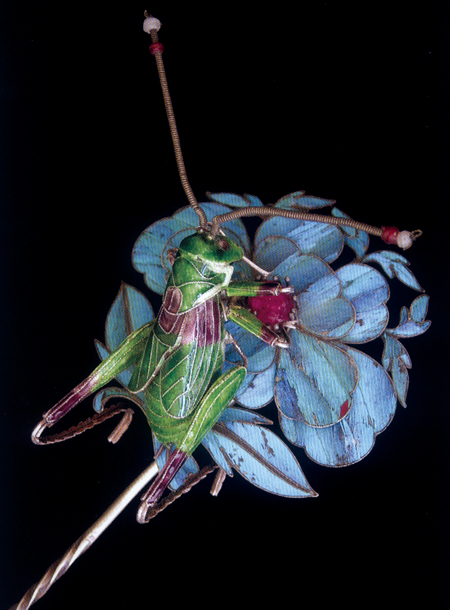 |
|
A dian cui hairpin of the Qing Dynasty. |
The youngster learned fast, although long hours of labor did test his patience from time to time. But if the old man was pleased with his son, he did not show it. "Every time, he would just pick up what I did, look at it really closely, and then put it down without saying a word," Xiao says. "For me, that meant a pass."
When all the social chaos eventually came to an end, at approximately the end of the 1970s, Xiao became a master in his own right. His reputation spread in the following decades, to the point where he found no need to hawk his trade.
"They all came to me - collectors from as near as Beijing, and as far as Hong Kong, Taiwan and Europe," he recalls. "I once repaired for a Hong Kong client a rare Qing Dynasty (1644-1911) hairpin, whose feathered surface was largely damaged because of age and lack of proper care. The owner later made the decision to sell it to the British Museum in London, a decision he would come to regret gravely."
The remorse over letting go something that should have been kept for a much longer time - if only for its value to appreciate - does not solely hit the collector. Xiao shares similar feelings. Having helped to bring to life hundreds, if not thousands, of antique dian cui pieces, he saved almost nothing for himself, always choosing to sell after an item was finished.
Over time, two different tendencies have coalesced within the same person: One demands the beauty of his art to be seen and appreciated, by as many people as possible; the other wants to hide it, at least the creation of it, completely from public view.
For the past two years, failing eyesight has largely prevented Xiao from working. And it was not before much persuasion and coaxing that his only daughter reluctantly agreed to learn his art. (He also asked his son and daughter-in-law, but neither showed any interest.)
So, what's next? Will there be one day when dian cui will be lost forever, like many age-old techniques that have suffered the same fate?
"That's beyond my answering," Xiao says.
| Master strokes | Fresh-faced art |
|
|
|
|
|
|
|
|